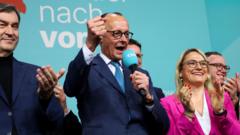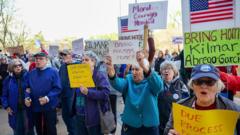In a pivotal election, Friedrich Merz's Christian Democrats emerged victorious; however, the far-right Alternative for Germany achieved a notable record, highlighting a divided political landscape.
Germany's Election Results: Conservatives Triumph Amidst Far-Right Surge

Germany's Election Results: Conservatives Triumph Amidst Far-Right Surge
Friedrich Merz's conservatives win German elections, but the far-right Alternative for Germany achieves historic gains.
Friedrich Merz, leader of the conservative Christian Democratic Union (CDU), celebrated his party's victory in Germany's recent elections, although they fell short of the anticipated 30% vote-share, securing approximately 28.6%. Addressing jubilant supporters, Merz emphasized his commitment to forming a coalition government with the center-left Social Democrats (SPD) led by Olaf Scholz. He underscored the need for European unity and asserted that Germany should work towards greater independence from American influences, particularly in light of recent geopolitical tensions.
The outcome of the election brought an unexpected surge in support for the far-right Alternative for Germany (AfD), which achieved a record second-place result of 20.8%. AfD leader Alice Weidel expressed satisfaction but noted that the party had hoped for a larger share of the vote. The AfD's rise was attributed to growing public dissatisfaction concerning high living costs and security issues, especially following several violent incidents in German cities during the campaign.
Merz, despite his lack of previous ministerial experience, has vowed that if he becomes Chancellor, he would prioritize European leadership and bolster support for Ukraine, criticizing former US President Donald Trump's dismissive approach to European affairs. The election saw a significant voter turnout of 83%, reflecting a populace eager for change.
Meanwhile, political analysts noted a fracturing of Germany's traditional political landscape. The CDU was unsuccessful in attracting younger voters, who showed increasing interest in the AfD and other parties, such as Die Linke, which also gained traction through viral campaigns on platforms like TikTok. As Merz prepares for negotiations to establish a governing coalition, he faces the challenge of uniting a divided electorate amidst growing discontent.
As the election reshapes Germany’s political dynamics, both regional and national implications are anticipated, and observers are keenly watching how Merz will navigate forming a functional and sustainable government in light of competing interests and rising populist sentiment.





















